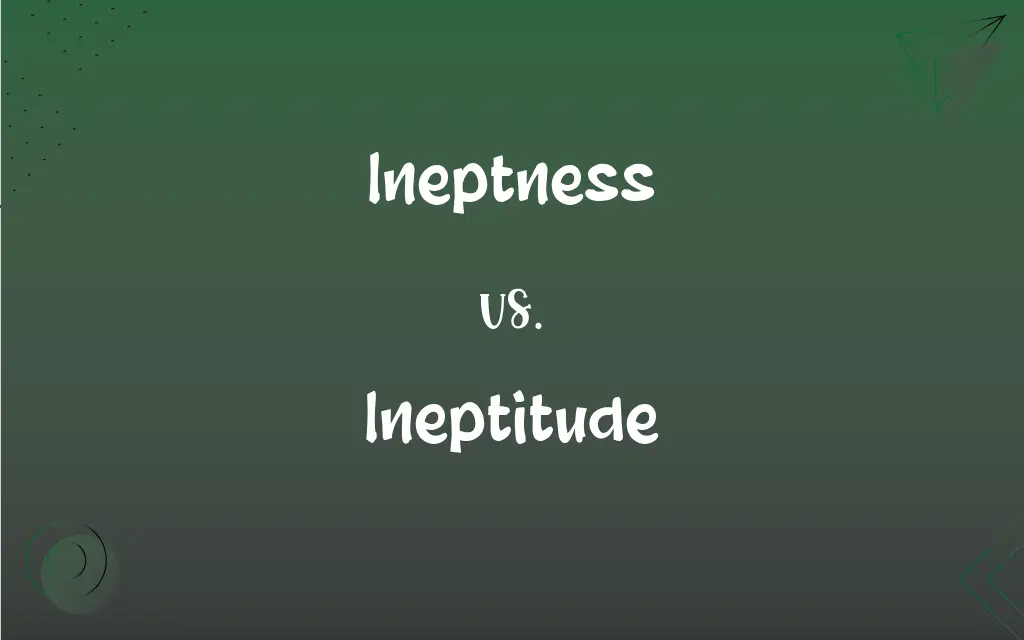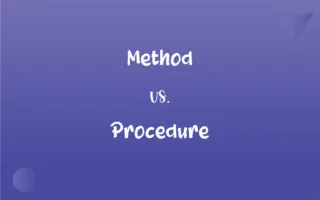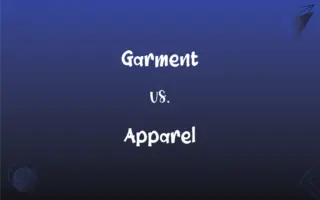Ineptness vs. Ineptitude: What's the Difference?
Edited by Aimie Carlson || By Harlon Moss || Updated on November 7, 2023
Ineptness and ineptitude both refer to a lack of skill or ability, but ineptitude often suggests a more inherent or chronic condition.

Key Differences
Ineptness is the condition of being unskilled or lacking competence in a particular area or task. It implies a temporary or situational inability to perform adequately. Ineptitude, while similar in meaning, often conveys a more ingrained lack of ability, potentially suggesting a natural deficiency or unsuitability for a task.
The term ineptness might be used to describe a specific instance of poor performance, such as a momentary failure or mishandling of a situation. Ineptitude, however, would typically refer to a more consistent pattern of inability, indicating a deeper problem than just a one-off mistake or a bad day.
Ineptness can be seen in situations where someone is new to a task and thus makes mistakes due to inexperience. Ineptitude, on the other hand, would describe a scenario where the individual continues to perform poorly even after being given adequate time to learn and adapt.
One might say that ineptness is something that training and experience can remedy. In contrast, ineptitude may imply that no amount of training can overcome the fundamental lack of aptitude for certain tasks or skills.
Both terms are often used interchangeably but contextually, ineptness could be considered a subset of ineptitude, being less severe and more correctable, while ineptitude is more absolute and pervasive, often beyond the scope of improvement.
ADVERTISEMENT
Comparison Chart
Definition
Lack of skill in a particular situation
General lack of skill or ability
Implication
Temporary, situation-specific
Chronic, potentially inherent inability
Severity
Often less severe, may be corrected
More severe, suggests deeper issues
Usage
Contextual to an event or task
Describes a general state or characteristic
Connotation
Could imply inexperience or need for improvement
Implies a significant deficiency or incompetence
ADVERTISEMENT
Ineptness and Ineptitude Definitions
Ineptness
Temporary clumsiness or awkwardness.
Her ineptness with the new software was evident.
Ineptitude
Chronic inability to perform adequately.
The project failed because of the manager's ineptitude.
Ineptness
Lack of skill displayed in a specific context.
His ineptness at the game was due to lack of practice.
Ineptitude
General lack of ability or competence.
His ineptitude with numbers made accounting a bad career choice.
Ineptness
Inability to act effectively in a situation.
The team's ineptness led to a series of unfortunate mistakes.
Ineptitude
Inherent awkwardness or clumsiness.
Her ineptitude in social situations was well-known.
Ineptness
Display of incompetence in a particular instance.
The mishandling of the event was pure ineptness.
Ineptitude
Enduring unsuitability for performing tasks.
His ineptitude in leadership roles became increasingly apparent.
Ineptness
Condition of being unsuitable for a specific task.
The actor's ineptness for the role was clear during rehearsals.
Ineptitude
A deep-seated lack of skill or aptitude.
The team's continuous losses were blamed on managerial ineptitude.
Ineptness
Lacking or showing a lack of skill or competence; bungling or clumsy
An inept actor.
An inept performance.
Ineptitude
The quality of being inept; ineptness.
Ineptness
Showing a lack of judgment, sense, or reason; inappropriate or foolish
An inept remark.
Ineptitude
An inept act or remark.
Ineptitude
The quality of being inept.
Ineptitude
An instance of being inept.
Ineptitude
The quality of being inept; unfitness; inaptitude; unsuitableness.
That ineptitude for society, which is frequently the fault of us scholars.
Ineptitude
Absurdity; nonsense; foolishness.
Ineptitude
Unskillfulness resulting from a lack of training
FAQs
Are ineptness and ineptitude synonyms?
Yes, but with nuances in their implications.
Can someone be naturally prone to ineptitude?
In some cases, ineptitude can be an inherent trait.
Does ineptness affect all areas of performance?
No, it's usually specific to particular tasks or situations.
Can ineptness be improved with practice?
Often, yes, as it may be due to inexperience.
Does training always overcome ineptitude?
Not always; some may not improve despite training.
Does ineptness imply failure?
Not always; it may just indicate a need for growth.
Can a professional exhibit ineptness?
Yes, if they're facing an unfamiliar task.
Is ineptitude a lack of intelligence?
Not necessarily; it's more about skill or ability in certain areas.
Can ineptness be context-dependent?
Absolutely, context can greatly influence performance.
Is ineptitude linked to a specific industry?
No, it can apply to any field or discipline.
Is ineptitude always a permanent condition?
Not always, but it often suggests a lasting issue.
Is ineptness always noticeable?
It can be, especially if it affects task performance.
Can a successful person have ineptitude in some areas?
Yes, people can be very skilled in some areas and not in others.
Does age affect ineptness?
Experience with age can reduce ineptness.
Can ineptness be isolated to one event?
Yes, it can manifest in a single, isolated event.
Can ineptitude be misjudged for a bad attitude?
Sometimes, especially if the reasons for underperformance are not clear.
Is ineptness the same as making a mistake?
No, it's more about a pattern of ineffective actions.
Is ineptitude always a bad thing?
It can be negative in professional contexts but could be neutral in non-relevant areas.
How do you identify ineptitude?
It's typically identified by consistent underperformance.
Can ineptness lead to ineptitude?
If not addressed, repeated ineptness might be seen as ineptitude.
About Author
Written by
Harlon MossHarlon is a seasoned quality moderator and accomplished content writer for Difference Wiki. An alumnus of the prestigious University of California, he earned his degree in Computer Science. Leveraging his academic background, Harlon brings a meticulous and informed perspective to his work, ensuring content accuracy and excellence.
Edited by
Aimie CarlsonAimie Carlson, holding a master's degree in English literature, is a fervent English language enthusiast. She lends her writing talents to Difference Wiki, a prominent website that specializes in comparisons, offering readers insightful analyses that both captivate and inform.































































